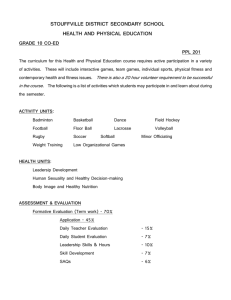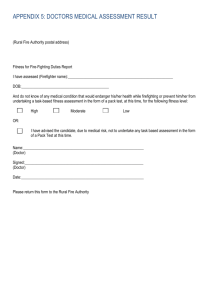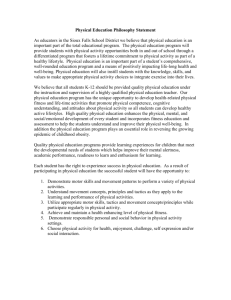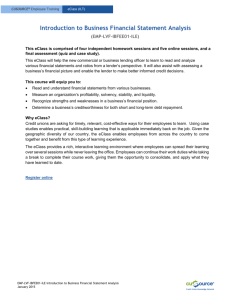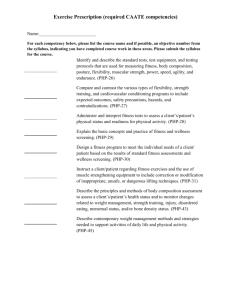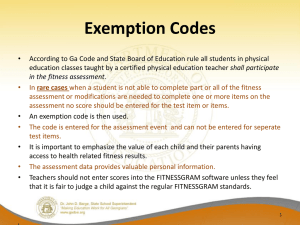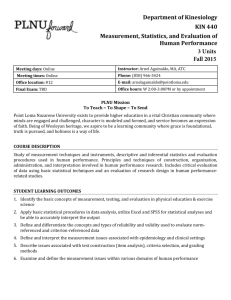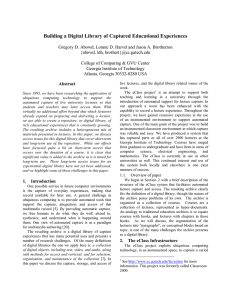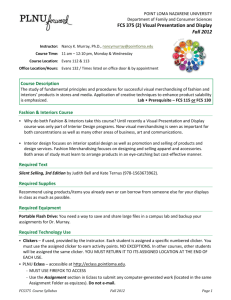PED 200 Optimal Health
advertisement
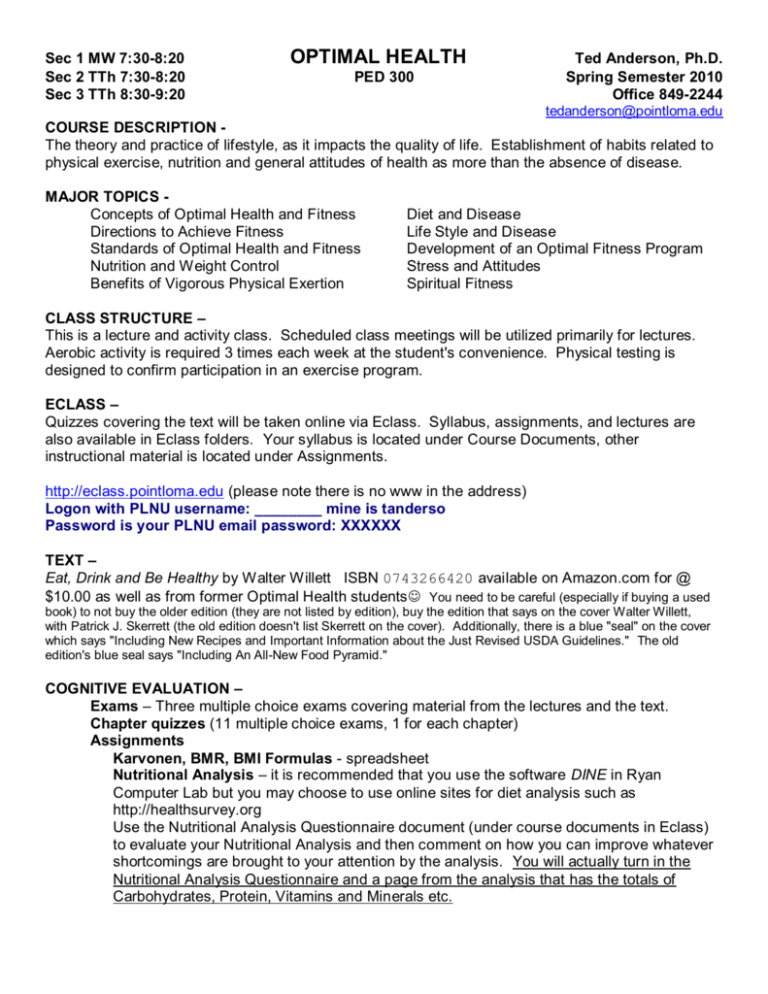
Sec 1 MW 7:30-8:20 Sec 2 TTh 7:30-8:20 Sec 3 TTh 8:30-9:20 OPTIMAL HEALTH PED 300 Ted Anderson, Ph.D. Spring Semester 2010 Office 849-2244 tedanderson@pointloma.edu COURSE DESCRIPTION The theory and practice of lifestyle, as it impacts the quality of life. Establishment of habits related to physical exercise, nutrition and general attitudes of health as more than the absence of disease. MAJOR TOPICS Concepts of Optimal Health and Fitness Directions to Achieve Fitness Standards of Optimal Health and Fitness Nutrition and Weight Control Benefits of Vigorous Physical Exertion Diet and Disease Life Style and Disease Development of an Optimal Fitness Program Stress and Attitudes Spiritual Fitness CLASS STRUCTURE – This is a lecture and activity class. Scheduled class meetings will be utilized primarily for lectures. Aerobic activity is required 3 times each week at the student's convenience. Physical testing is designed to confirm participation in an exercise program. ECLASS – Quizzes covering the text will be taken online via Eclass. Syllabus, assignments, and lectures are also available in Eclass folders. Your syllabus is located under Course Documents, other instructional material is located under Assignments. http://eclass.pointloma.edu (please note there is no www in the address) Logon with PLNU username: ________ mine is tanderso Password is your PLNU email password: XXXXXX TEXT – Eat, Drink and Be Healthy by Walter Willett ISBN 0743266420 available on Amazon.com for @ $10.00 as well as from former Optimal Health students You need to be careful (especially if buying a used book) to not buy the older edition (they are not listed by edition), buy the edition that says on the cover Walter Willett, with Patrick J. Skerrett (the old edition doesn't list Skerrett on the cover). Additionally, there is a blue "seal" on the cover which says "Including New Recipes and Important Information about the Just Revised USDA Guidelines." The old edition's blue seal says "Including An All-New Food Pyramid." COGNITIVE EVALUATION – Exams – Three multiple choice exams covering material from the lectures and the text. Chapter quizzes (11 multiple choice exams, 1 for each chapter) Assignments Karvonen, BMR, BMI Formulas - spreadsheet Nutritional Analysis – it is recommended that you use the software DINE in Ryan Computer Lab but you may choose to use online sites for diet analysis such as http://healthsurvey.org Use the Nutritional Analysis Questionnaire document (under course documents in Eclass) to evaluate your Nutritional Analysis and then comment on how you can improve whatever shortcomings are brought to your attention by the analysis. You will actually turn in the Nutritional Analysis Questionnaire and a page from the analysis that has the totals of Carbohydrates, Protein, Vitamins and Minerals etc. Critique - Each student will research a topic of their choice, hopefully on a topic you care about. Perhaps you or a family member have a health concern, use this assignment to find out more about the topic. You will demonstrate your ability to be a competent consumer as well as supplementing information contained in class lectures and readings. Examples of appropriate topics include critiquing new exercise equipment, diets, recipes, weight loss programs etc. It is important to add to the information presented in class, and not repeat it. This will be a written report usually about 2 pages long.. Course Evaluation – Fill out the course evaluation (via eclass) at the end of the course. PHYSICAL EVALUATION – Students will receive points for either maintaining their currently high fitness level or by making progress toward an improved fitness profile. Fitness Parameters 1.) 3 Minute Step Test, Peak Heart Rate recorded as well as 1 minute Recovery Heart Rate 2.) Body Composition – estimated body fat % measured by skinfold caliper using the Jackson/Pollack formula 3.) Body Weight GRADING – Cognitive Assessment – 50% broken down as follows below. Exams – 30% Chapter Quizzes on Eclass – 20% Assignments – 30% broken down as follows below. Karvonen, BMR, BMI Formulas – spreadsheet – 5% Nutritional Analysis – 15% Critique – 10% * Class projects may be substituted for Critique assignment Physical Assessment – 20% broken down as follows below. Cardiovascular Assessment – 15% Body Composition – 5% Final Exam Schedule Your Optimal Health Final is your last opportunity to perform your Post-test Step Test. Sec 1 (MW 7:30-8:20) will meet Wed., May 12 at 8:00 a.m. (females 8:00 a.m., males 8:30 a.m.) Sec 2 (TTh 7:30-9:20) will meet Thursday, May 13 at 8:00 a.m. (females 8:00 a.m., males 8:30 a.m.) Sec 3 (TTh 8:30-9:20) will meet Tuesday, May 11 at 8:00 (females 8:00 a.m., males 8:30 a.m.) "All students are expected to meet the standards for this course as set by the instructor. However, students with learning disabilities who may need accommodations should discuss options with the Academic Support Center (ASC) during the first two weeks of class. The ASC will contact professors with suggestions related to classroom needs and accommodations. Approved documentation must be on file in the ASC prior to the start of the semester." This course meets a General Education requirement as we “Explore an Interdependent World” through “Physical Fitness and Nutrition.” Mind, Body, and Spirit are uniquely brought together in this course, as we become Liberally Educated.



